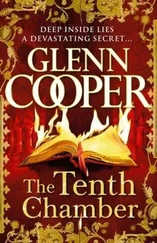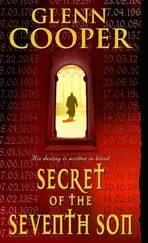Glenn Cooper - Book of Souls
Здесь есть возможность читать онлайн «Glenn Cooper - Book of Souls» весь текст электронной книги совершенно бесплатно (целиком полную версию без сокращений). В некоторых случаях можно слушать аудио, скачать через торрент в формате fb2 и присутствует краткое содержание. Жанр: Триллер, на английском языке. Описание произведения, (предисловие) а так же отзывы посетителей доступны на портале библиотеки ЛибКат.
- Название:Book of Souls
- Автор:
- Жанр:
- Год:неизвестен
- ISBN:нет данных
- Рейтинг книги:5 / 5. Голосов: 1
-
Избранное:Добавить в избранное
- Отзывы:
-
Ваша оценка:
- 100
- 1
- 2
- 3
- 4
- 5
Book of Souls: краткое содержание, описание и аннотация
Предлагаем к чтению аннотацию, описание, краткое содержание или предисловие (зависит от того, что написал сам автор книги «Book of Souls»). Если вы не нашли необходимую информацию о книге — напишите в комментариях, мы постараемся отыскать её.
Book of Souls — читать онлайн бесплатно полную книгу (весь текст) целиком
Ниже представлен текст книги, разбитый по страницам. Система сохранения места последней прочитанной страницы, позволяет с удобством читать онлайн бесплатно книгу «Book of Souls», без необходимости каждый раз заново искать на чём Вы остановились. Поставьте закладку, и сможете в любой момент перейти на страницу, на которой закончили чтение.
Интервал:
Закладка:
“Could any of this stuff date back to the fifteen hundreds?”
“Possibly.”
Will shook his throbbing head and swore.
The banqueting hall was connected via a short corridor to the chapel, a small stone sanctuary, the Cantwells’ private house of worship, five rows of pews and a small limestone altar. It was simple and quiet, Christ crucified looking down on empty pews splashed by morning sunlight that filtered through stained glass. “Not used much,” Isabelle said, “though Granddad wants the family to do a private mass for him here when his time comes.”
He pointed over his head. “Is this the spire I can see from my bedroom?” Will asked.
“Yes, come and look.”
She led him outside. The grass was thick and wet, the sun made everything glisten. They stepped into the garden, just far enough to get a glimpse at the stone chapel, and the sight of it almost made him laugh. It was a curious little building, a novelty with a distinctive Gothic architecture, two rectangular towers at the front facade and at its center over a rectangular nave and transept, a steep pointy spire that looked like a lance thrust into the air.
“Recognize it?” she asked.
He shrugged.
“It’s a miniature version of the Cathedral of Notre Dame in Paris. Edgar Cantwell had it built in the sixteenth century. I think the real thing made an impression.”
“You’ve got an interesting family,” Will said. “My guess is the Pipers probably cleaned the shit off of the Cantwells’ shoes.”
To Will, the only good thing about the long hours that followed was that his hangover slowly resolved. They spent the morning rummaging through the banqueting hall, focused on Flanders and the wind, but cognizant of the remaining clues as well-a prophet’s name, a son who sinned-as vague as they were. By lunchtime he had a fair appetite.
The old man was up and about and joined them for sandwiches. His memory wasn’t all there, so it was easy for Isabelle to deflect him from the Vectis letter. However, he did remain fixed on the purported Shakespeare poem because it seemed that financial worries were foremost on his mind.
He inquired again about Will’s intentions and was reassured that if the research went well, the letter would be his. He encouraged his granddaughter to be as helpful as possible, then rambled on about auction houses and how he’d have to let Pierce & Whyte take a crack at the business owing to their success with the last auction, but that Sotheby’s or Christie’s made more sense for something of this importance. Then he excused himself to do his correspondence.
Before returning to the banqueting hall, they took advantage of Lord Cantwell puttering around the ground floor to sneak upstairs and have a poke through his bedroom. Isabelle couldn’t recall whether there was anything of interest up there as she hadn’t entered in years. But it was among the oldest rooms in the house so it couldn’t be ignored. The bed was not yet made and smelled strongly of an old man’s incontinence, which neither of them commented on. The few paintings were portraits, and the vases, clocks, and small tapestries were devoid of windmill motifs. They beat a hasty retreat back to the banqueting hall, where they toiled for the remainder of the early afternoon, prying open crates and examining dozens of paintings and decorative items.
By late afternoon, they had gone through the dining room and the French room and were sweeping back through the library and the Great Hall, becoming increasingly discouraged.
Finally, Isabelle begged to stop for tea. The housekeeper was off doing shopping so Isabelle decamped to the kitchen, leaving Will in charge of starting a fire. The task got him into Boy Scout mode, and he diligently started rearranging fireplace bricks and building a platform of kindling that would optimize airflow and prevent smoke kickback. When he was done, he carefully placed the logs, lit his structure with a wooden match, sat back, and admired his work.
The fire caught quickly and began to send flames high into the vault. Fewer wisps escaped. Will’s old scoutmaster in Panama City would have been proud of him, prouder than his frozen-hearted father, who had verbally beat him up about most of his early accomplishments or lack thereof.
A melancholy was descending. He was tired, he was disappointed that he was getting his old cravings back. The bottle of scotch was still up in his room. As his mind wandered, so did his eyes. One of the blue-and-white Delft tiles lining the fireplace caught his eye. It was a charming scene of a mother walking through a field with a bundle of twigs under one arm and her toddler son on the other. She looked perfectly happy. She probably wasn’t married to a bastard like him, he thought.
Then his gaze drifted to the tile below it. He froze for a second, then sprang up, and when Isabelle came back in with a platter of tea, she found him standing by the fireplace, staring.
“Look,” he said.
She put the platter down and drew closer. “Oh my God,” she exclaimed. “Right in front of our eyes. I tapped on it yesterday.”
On the bank of a meandering country river was a small windmill, delicately painted in blue and white. The tile artist was skillful enough to make one imagine that the mill blades were about to be turned by a breeze rushing down the river valley, for in the distance, birds were dipping their wings in an unseen gust.
The tea went cold.
After Isabelle made sure her grandfather was upstairs napping, she fetched the toolbox from the hall closet and let Will choose his implements. “Please don’t break it,” she pleaded.
He promised to be careful but gave no guarantees. He selected the smallest, thinnest flat-edged screwdriver and a light hammer. Then, holding his breath, he began gently tapping the chiseled end into the smooth, hard grout.
It was slow, painstaking work, but the grout was softer than the tile, so it gradually yielded to the steel. When a vertical line was cleared, he started on the top horizontal one. In half an hour, both horizontal rows were grout-free. Because he was working so closely to his exuberant fire, he was slathered in sweat, and his shirt was damp. He thought he might be able to tap under the tile and pry it loose without removing the last row of grout. She was almost pressing against his back, watching every move. She gave nervous approval.
It took only three light, oblique taps of the screwdriver to make the tile lift from the fascia a satisfying eighth of an inch. Blessedly, it was in one piece. Will put the tools down and used his hands, raising and lowering the tile fractionally, then wiggling it laterally.
It came free in his hands, intact.
Immediately, they saw a round plug of wood in the center of the exposed square.
“That’s why it sounded the same as the others when I tapped on it yesterday,” she said.
Will used the edge of the screwdriver to lever out the plug. It was covering a one-inch hole bored deeply into the wood.
“I need a flashlight,” Will said urgently.
There was a penlight in the toolbox. He shined it in the hole and grabbed a pair of needle-nosed pliers.
“What do you see?” she pressed.
He closed the pliers on something, then pulled them out. “This.”
There was a single sheet of parchment, rolled into a cylinder.
“Let me see!” she almost screamed.
He let her unroll it and stood over her as she dropped to a chair. “It’s in French,” she said.
“Are we screwed?”
“Of course not,” she sniffed. “I read French quite well, thank you.”
“Like I said, I’m glad you’re here.”
“It’s a bit hard to make out, atrocious penmanship. It’s addressed to Edgar Cantwell. It’s dated 1530! Good Lord, Will, look who’s written it! It’s signed, Jean Cauvin.”
Читать дальшеИнтервал:
Закладка:
Похожие книги на «Book of Souls»
Представляем Вашему вниманию похожие книги на «Book of Souls» списком для выбора. Мы отобрали схожую по названию и смыслу литературу в надежде предоставить читателям больше вариантов отыскать новые, интересные, ещё непрочитанные произведения.
Обсуждение, отзывы о книге «Book of Souls» и просто собственные мнения читателей. Оставьте ваши комментарии, напишите, что Вы думаете о произведении, его смысле или главных героях. Укажите что конкретно понравилось, а что нет, и почему Вы так считаете.












